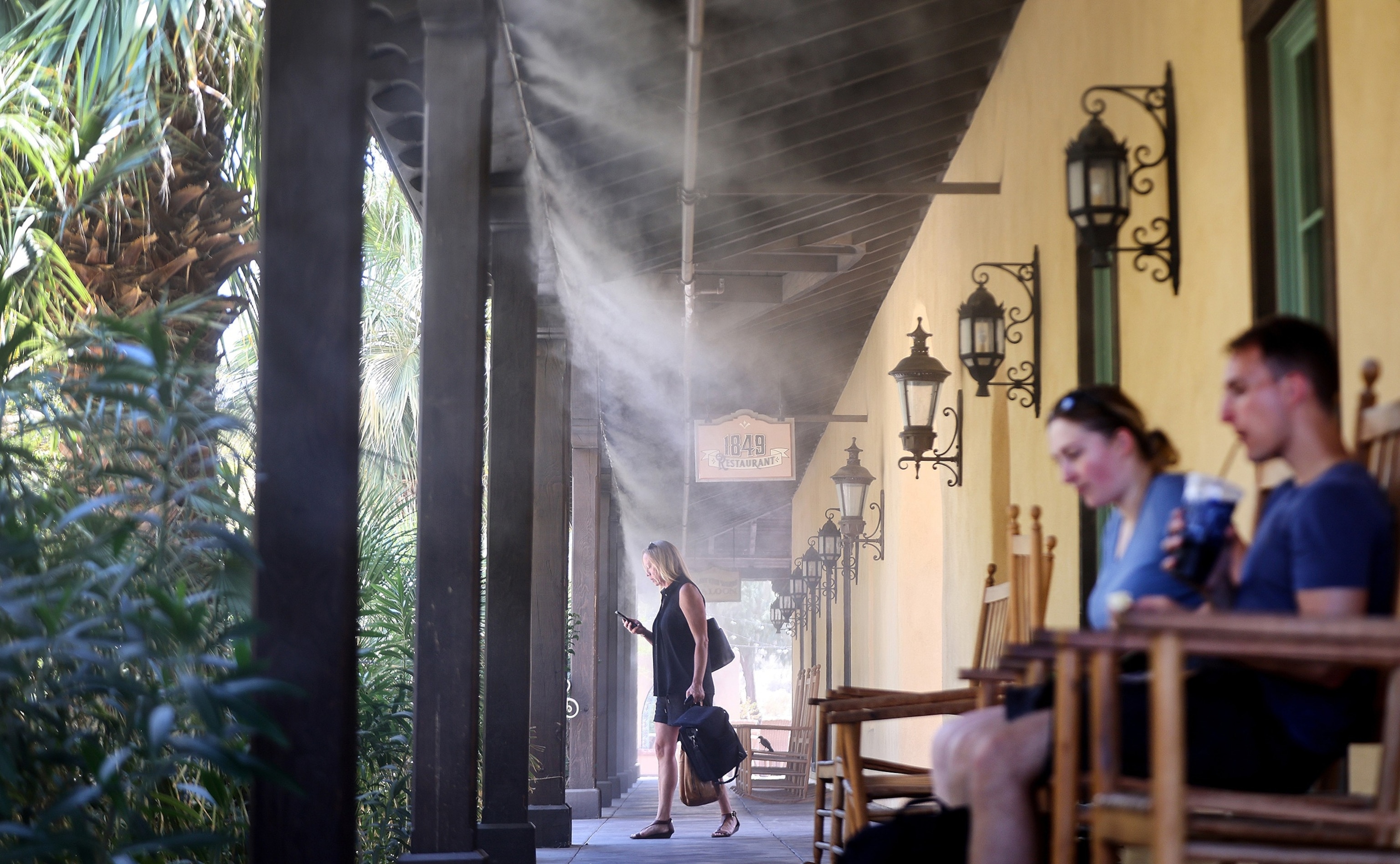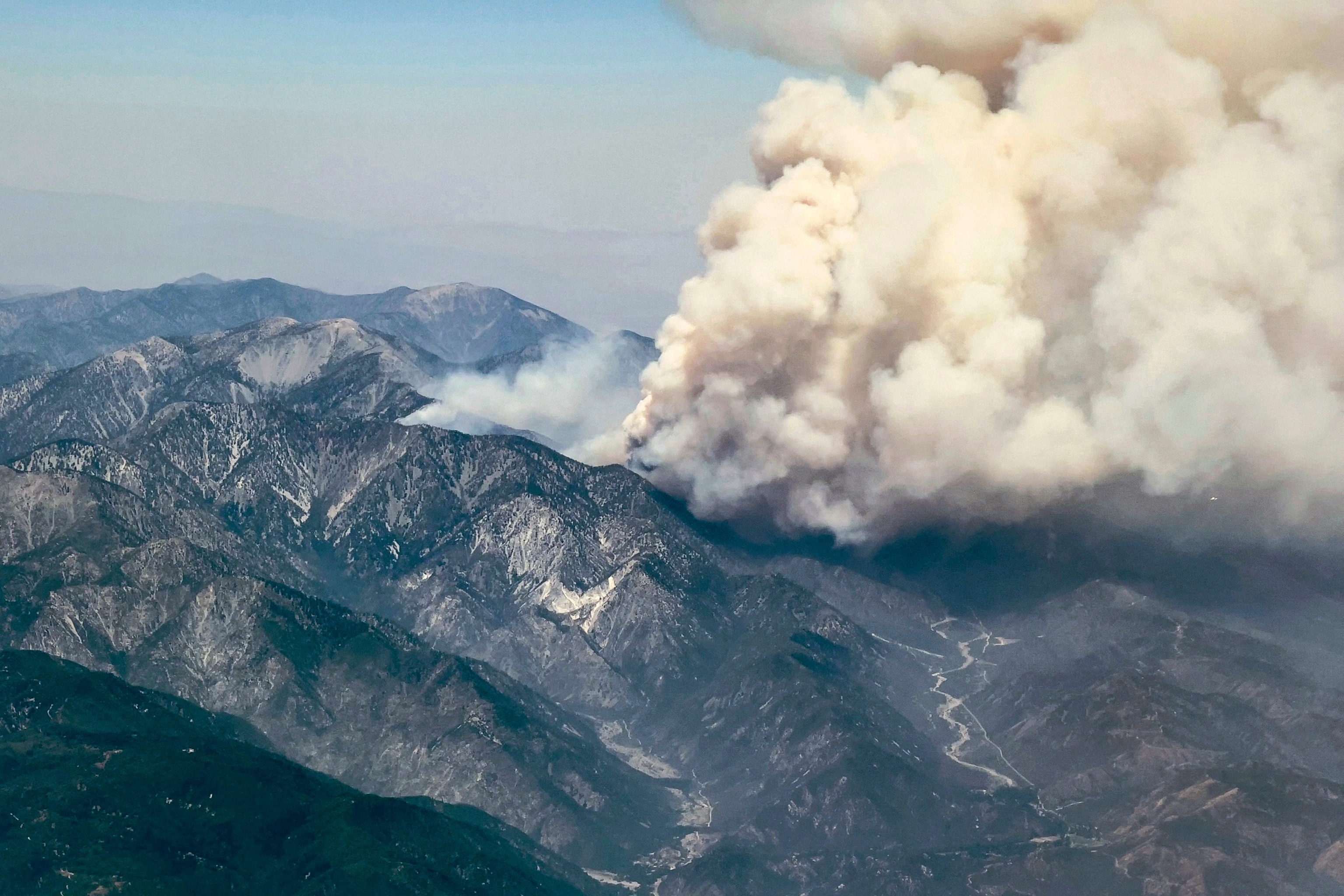State leaders are warning of a “hotter, smokier future” in the United States, but will their petition for federal emergency response be recognized by the government?
Extreme heat is responsible for more weather-related deaths than tornadoes, hurricanes, floods or any other natural disaster, according to the National Weather Service but, as of now is ineligible for Federal Emergency Management Agency (FEMA) response.
And wildfire smoke, which even at low levels leads to substantial increases in healthcare costs, illnesses and deaths, according to the Department of Environmental Health Sciences, similarly falls outside of FEMA protection.

People use umbrellas to shield themselves from the sun on July 16, 2024, in New York.
Adam Gray/Getty Images
This week, 14 state attorneys general from Arizona, California, Colorado, Connecticut, the District of Columbia, Illinois, Maryland, Massachusetts, Michigan, New Jersey, New Mexico, New York, Oregon and Vermont sent a letter of support to update FEMA’s regulations.
Leaders called on FEMA officials to “initiate a rulemaking” that would recognize extreme heat and wildfire smoke events as major disasters under the Stafford Act, the federal law that gives FEMA the power to respond to emergencies.

People gather beneath misters at a hotel during a long-duration heat wave which is continuing to impact much of California, on July 10, 2024, in Death Valley National Park, Calif.
Mario Tama/Getty Images
“The Act’s definition of ‘major disaster’ — ‘any natural catastrophe’ — plainly encompasses extreme heat and wildfire smoke events,” according to the letter dated July 16, which adds, “Extreme heat and wildfire smoke are in all respects as ‘natural’ as hurricanes, and their impacts are likewise catastrophic for communities across the United States.”
To support their petition, leaders note that 2,300 people officially died from heat exposure nationally in 2023, which was deemed the hottest year on record.

Smoke rises from the Vista fire as seen from a flight into Los Angeles International Airport, on July 9, 2024, over Los Angeles.
Corinne Chin/AP
In Arizona, extreme heat caused or contributed to more than 1,000 deaths in 2022, the AGs noted in the letter.
Not just deadly, but also costly, the group of attorneys general reference a recent study of extreme heat in California that found seven heat events contributed to approximately 460 deaths, thousands of hospitalizations and emergency department visits, and cumulatively cost $7.7 billion.
Pointing to climate change as a factor in the worsening weather events, the letter reads, “The likelihood of high-severity extreme heat and wildfire smoke events is increasing due in part to climate change,” warning, “Rising average global temperatures have made extreme heat events longer, more intense, more widespread, and deadlier.”
The attorneys general petition urges federal leaders that updating regulations is in the “best interest” of FEMA, state residents and the country as a whole.
Attorneys general from several states across the country are urging the Federal Emergency Management Agency (FEMA) to declare extreme heat and wildfire smoke as disasters. This call comes as the effects of climate change continue to worsen, leading to more frequent and severe heatwaves and wildfires.
Extreme heat and wildfire smoke pose significant health risks to individuals, particularly vulnerable populations such as the elderly, children, and those with preexisting health conditions. Heatwaves can lead to heat exhaustion, heatstroke, and even death, while wildfire smoke can exacerbate respiratory issues and cause long-term health problems.
By declaring extreme heat and wildfire smoke as disasters, FEMA would be able to provide additional resources and assistance to communities affected by these events. This could include funding for cooling centers, air purifiers, and other measures to help mitigate the impact of extreme heat and smoke on residents.
In a letter to FEMA Administrator Deanne Criswell, the attorneys general emphasized the importance of recognizing extreme heat and wildfire smoke as disasters in order to better protect public health and safety. They also called for increased federal funding and support for states and localities grappling with the effects of climate change.
The attorneys general’s efforts come at a critical time, as the United States continues to experience record-breaking temperatures and devastating wildfires. Climate scientists have warned that without immediate action to address climate change, these extreme weather events will only become more frequent and severe in the coming years.
In response to the attorneys general’s letter, FEMA has stated that they are reviewing the request and will work with state and local partners to address the impacts of extreme heat and wildfire smoke. However, some advocates argue that more needs to be done at the federal level to prioritize climate resilience and adaptation efforts.
Overall, the call by attorneys general to declare extreme heat and wildfire smoke as disasters highlights the urgent need for proactive measures to address the growing threat of climate change. By recognizing these events as disasters, FEMA can help ensure that communities are better prepared and equipped to respond to the challenges posed by extreme heat and wildfire smoke.



